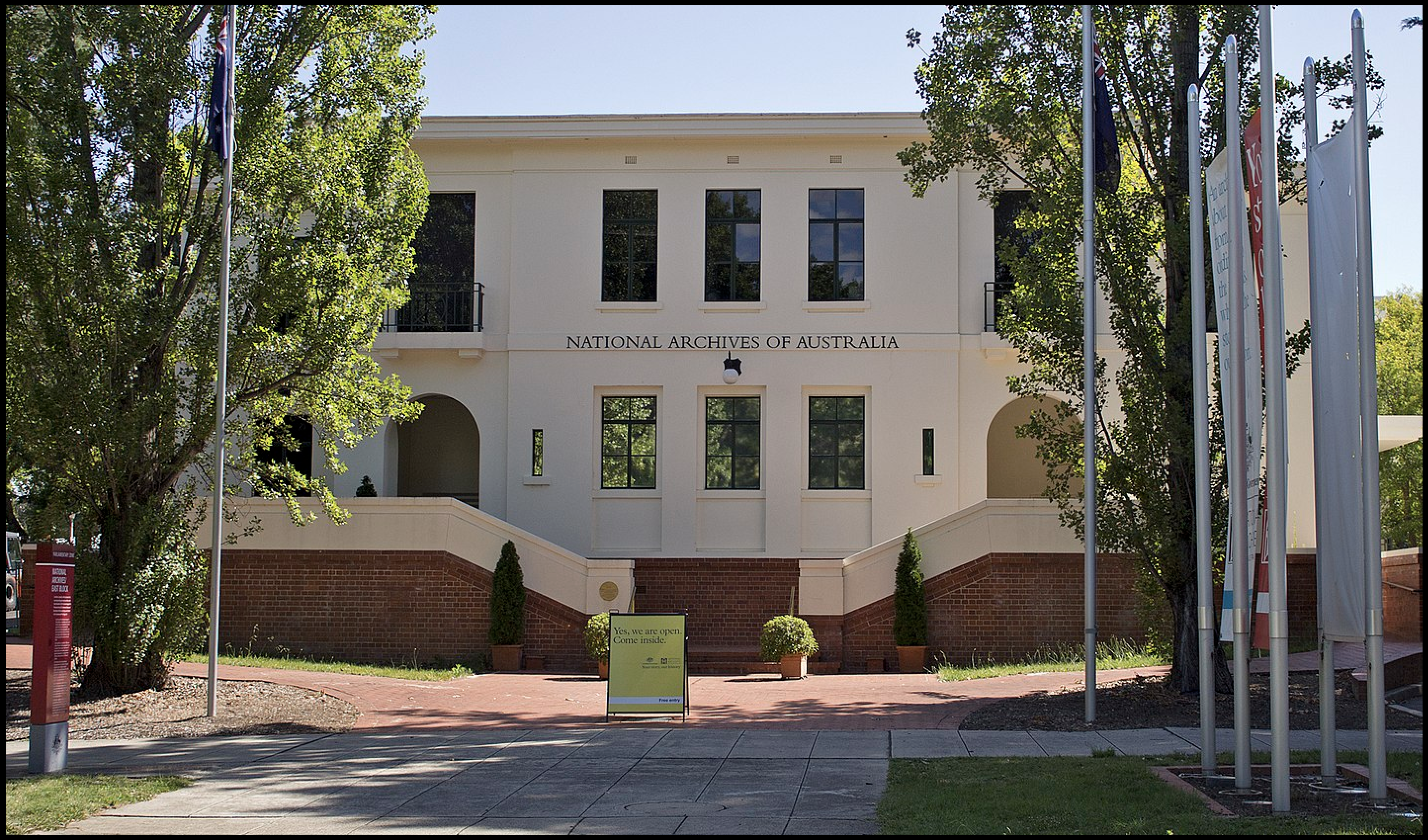Appreciate our quality journalism? Please subscribe here
DONATE
EXCLUSIVE
The 2022-23 annual report of the National Archives of Australia is “missing” from public records — three months after the legislated deadline.
In a remarkable new twist to the “missing” Iraq War cabinet documents scandal, The Klaxon can exclusively reveal National Archives failed to file its annual report in October last year.
Coalition-appointed National Archives boss Simon Froude — whose first day in the role was two days after the 2022 federal election — was due to file the annual report by October 15.
Commonwealth entities are required to file their financial year annual report with their responsible minister by October 15 each year and ministers are then expected to table the reports in parliament within a week.
Investigations by The Klaxon show that for the 2022-23 financial year, annual reports for 146 Commonwealth entities have been tabled in parliament and made public — yet not the National Archives annual report.
In response to a series of questions put to National Archives Director-General Froude, the agency said it had been granted an “extension” from October 15 to “November 30”.
Yet the report has still not been made public.
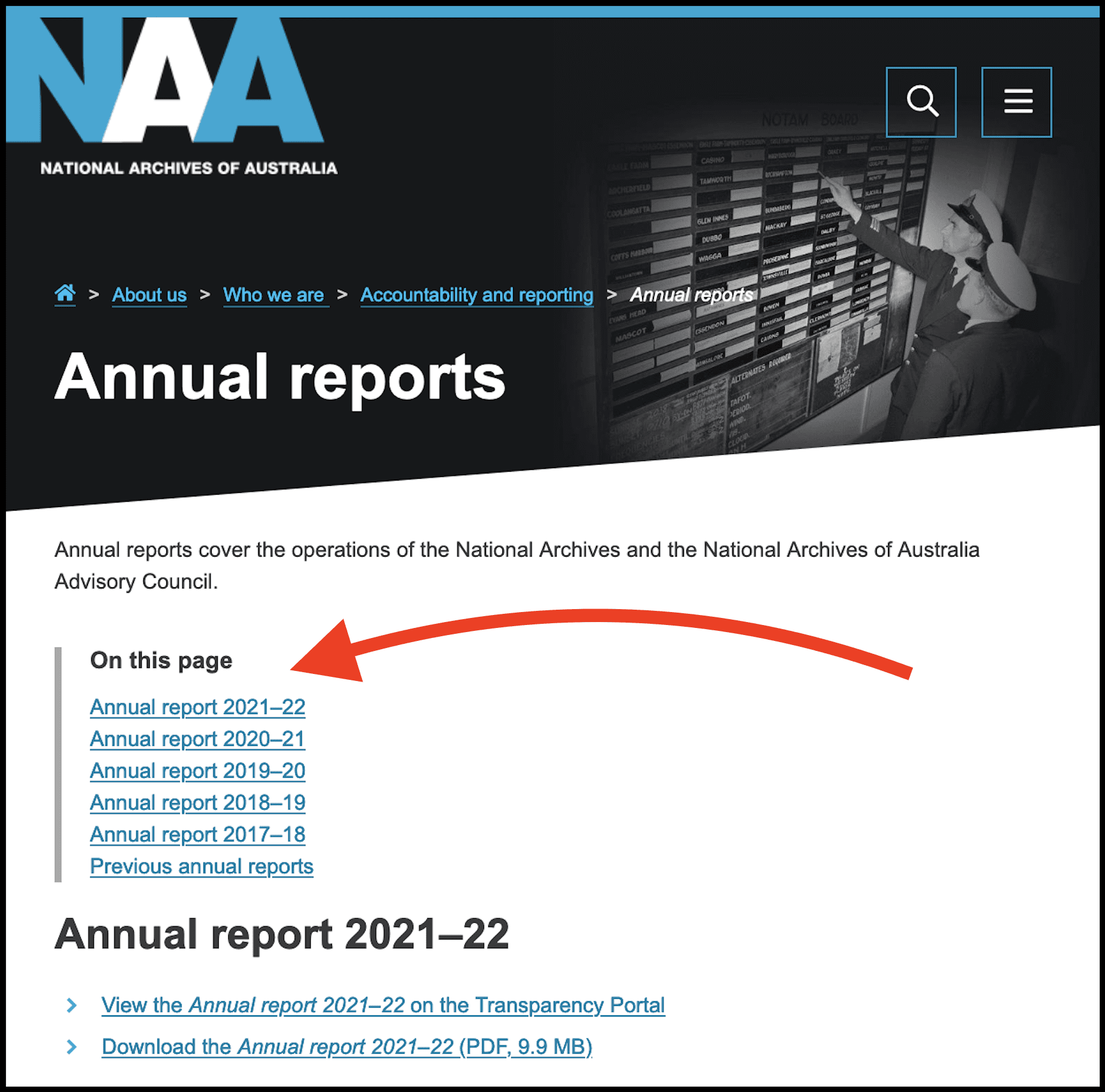
Missing: The 2022-23 annual report. Source: National Archives of Australia
The “missing” annual report is particularly notable in light of the “missing” cabinet papers scandal.
Commonwealth entities, like National Archives, must, by law, include in their annual reports details of “significant events”, that have occurred in the relevant period.
On January 1, in a shock statement, the Department of Prime Minister and Cabinet (PM&C) announced that, under the Coalition Morrison Government in 2020, PM&C had failed to hand to National Archives all the cabinet papers for the year 2003.
Each year on January 1 National Archives releases cabinet papers from 20 years earlier, having obtained those records from PM&C several years in advance.
In 2003 the Howard Coalition Government joined the US-led invasion of Iraq, with the reasons for doing so never fully explained to the public.
The January 1 PM&C statement does not state who wrote it and it quotes no individuals.
It states the “handover” of the 2003 cabinet papers to National Archives occurred in 2020 — but that some of the documents had not been handed over, citing “apparent administrative oversights”.
“The additional records were located by the Department on 19 December 2023,” PM&C said.
“These oversights were likely a result of Covid-19 disruptions at the time”.
“The additional records were located by the Department on 19 December 2023” – PM&C
The event is unprecedented — and highly significant.
Please SUBSCRIBE HERE and support our quality journalism

National Archives of Australia Director-General Simon Froude. Photo: Public Sector Network/YouTube
The Federal Government is accused of cover-up over the affair — including by Federal independent Andrew Wilkie, a former Federal intelligence analyst.
Central to the scandal is who knew what and when.
The Federal Government has addressed the affair only twice: in the January 1 PM&C statement and when Prime Minister Anthony Albanese fronted the media on January 3.
“It’s clear that there were some Cabinet records missing from that [2020] transfer from the Government,” Albanese said.
“Some 78 Cabinet records were not transferred to the National Archives”.
Albanese continued PM&C’s assertion regarding timing.
“The current head of PM&C (Secretary Glyn Davis) was only notified of the failure to forward the 78 documents just before Christmas,” he told media.
“The public service have now, within days of being notified of that, provided the remaining documents to the Archives”.
Yet despite the public claims, PM&C has since January 1 refused to respond to The Klaxon when asked when “PM&C” — not its secretary Davis — first became aware of the “missing” documents.
In its January 1, statement PM&C suggested (although did not expressly state) they included documents from the National Security Committee, a top-secret and top-level arm of the federal cabinet which makes key national security decisions, such as going to war.
Albanese appeared to confirm this on January 3, stating “Australians have a right to know the basis upon which Australia went to war in Iraq”.
Commonwealth entities can apply to their relevant minister for an “extension” to file their annual report beyond the October 15 legislated deadline.
Yet they may only do so “if it would not be reasonably possible” for the annual report to be “prepared within the specified time frames”, the Acts Interpretation Act 1901 states.
The minister responsible for the National Archives is Arts Minister Tony Burke.
Burke did not respond to a series of questions put to him by The Klaxon on January 5.
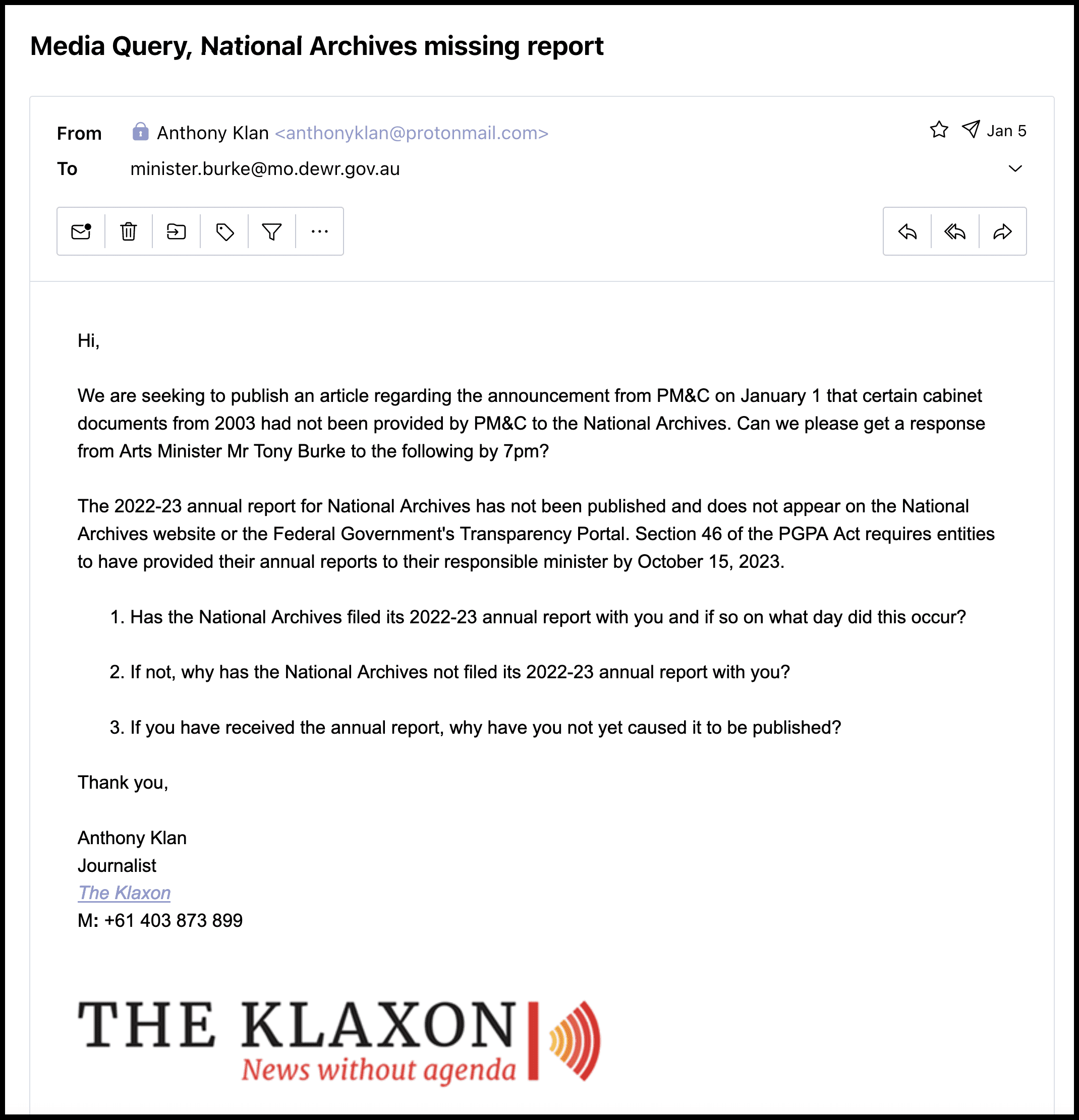
Unanswered: Questions put to Arts Minister Tony Burke on January 5
In its statement to The Klaxon, National Archives said the Minister (Burke) had on October 24 provided it with an extension and that its annual report was “provided to the Minister on 30 November 2023”.
“This later date met an extension to the reporting deadline that was provided by the minister on 24 October 2023”.
Yet — six weeks later — Burke has still not tabled the document parliament, and so it remains hidden from the public.
There is no requirement for parliament to be sitting for such documents to be tabled, instead they are routinely tabled “out-of session”.
In a statement to The Klaxon on January 5, National Archives said its annual report was expected to be tabled “later this month”.
This Wednesday, January 17, is when the “independent review” into the “missing” cabinet affair is due to be completed.
In its January 1 statement PM&C said a “Mr Dennis Richardson” had been appointed to conduct an “independent review” into the affair.
It provided no details about Richardson.
On January 3 Albanese said Richardson would “report within the next two weeks”.
Richardson was until 2017 a senior Federal public servant.
As previously reported, Richardson was himself at — and an intimate contributor to — the National Security Committee (NSC) meetings to which the “missing” documents relate.
Please SUBSCRIBE HERE and support our quality journalism
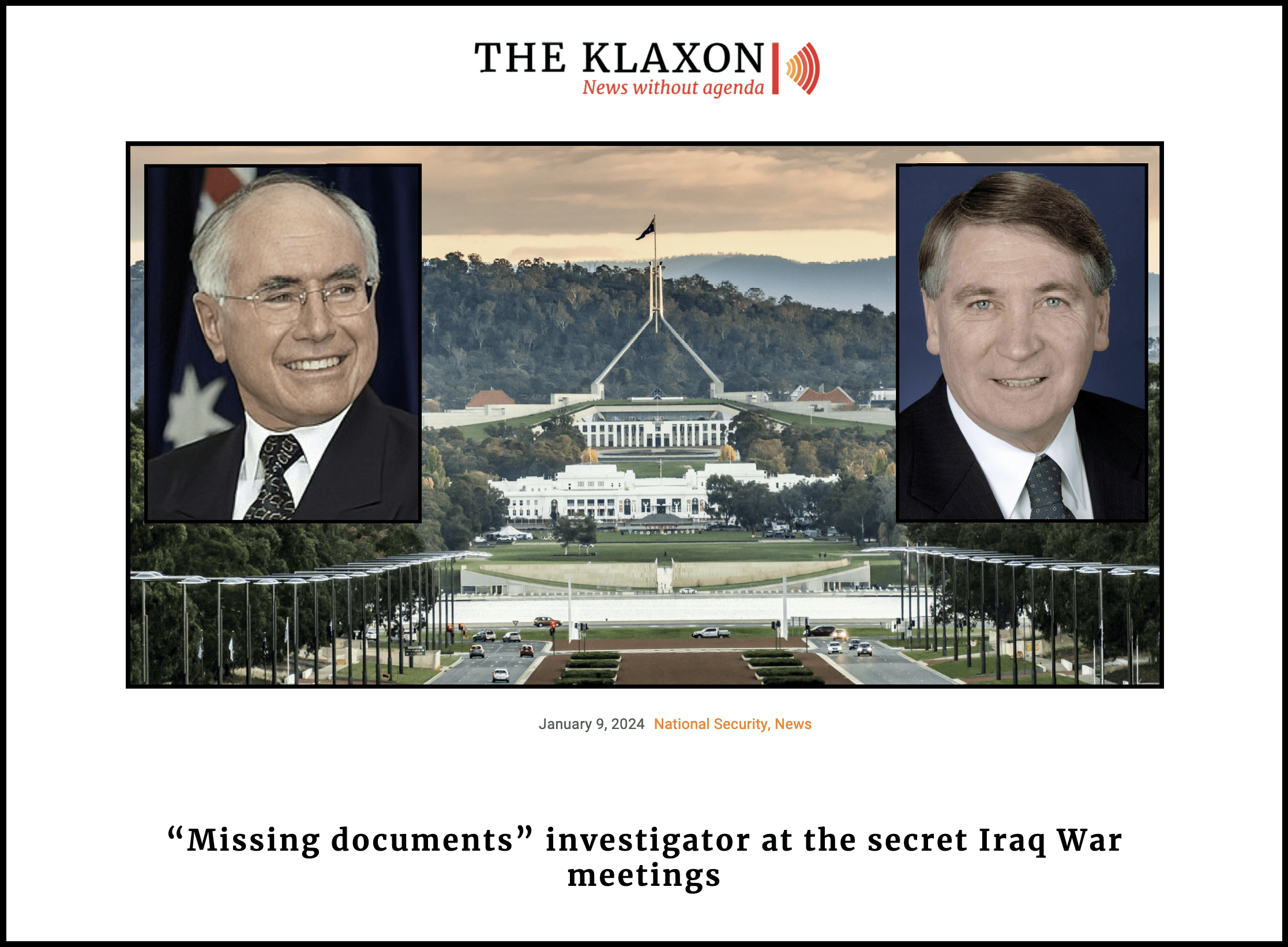
The Klaxon’s story last week. Source: The Klaxon
Richardson was Director-General of national security agency ASIO from 1996 until 2005.
He was appointed to the role by Coalition Prime Minister John Howard, in Howard’s first year in office.
According to a cabinet papers explainer document released by the National Archives earlier this month, a small number of senior government officials, including the head of ASIO “attended all meetings” of the NSC in 2003.
“Ministers [sat] on one side of the table and officials on the other,” it states.
There was a surge in NSC meetings in 2003 as a result of Iraq, the document states, and the NSC met 64 times in the 2002-03 financial year (the decision to invade was made on March 18, 2003).
ASIO was actively providing intelligence and security briefs to the NSC at the time, including domestic threats that could arise, such as terrorism, as a result of Australia joining the Iraq invasion.
In its role, ASIO also exchanges intelligence with foreign intelligence agencies, including the Central Intelligence Agency (CIA) in the US and MI5 and MI6 in the UK, writes intelligence expert Richard Kerbaj in The Secret History of the Five Eyes.
(ASIO’s 2003 annual report states its roles include “foreign intelligence” and “collecting foreign intelligence” through “ASIO’s security intelligence investigations and liaison with overseas partners”).
A key reason stated for invading Iraq – intelligence reports it was harbouring “weapons of mass destruction” – proved false.
“Intelligence reports Iraq was harbouring weapons of mass destruction proved false”
In its January 1 statement PM&C said its Secretary Davis had appointed Richardson to “undertake an independent review of the 2020 transfer process” and “confirm that all relevant records have been transferred to Archives”.
Neither PM&C nor Albanese have said how the “review” by Richardson is “independent”.
Dennis Richardson
1996–2005: ASIO Director-General
2005-2010: Australian Ambassador to US
Jan 2010-Oct 2012: Secretary of DFAT
Oct 2012-May 2017: Secretary of Department of Defence
Richardson is conducting the review as a private citizen, for a payment PM&C has not disclosed.
As previously reported, since 2018, Richardson has been given three other Federal Government contracts totaling $1.0297 million — including a $50,000-a-month ($148,000) contract from PM&C between August and October last year.
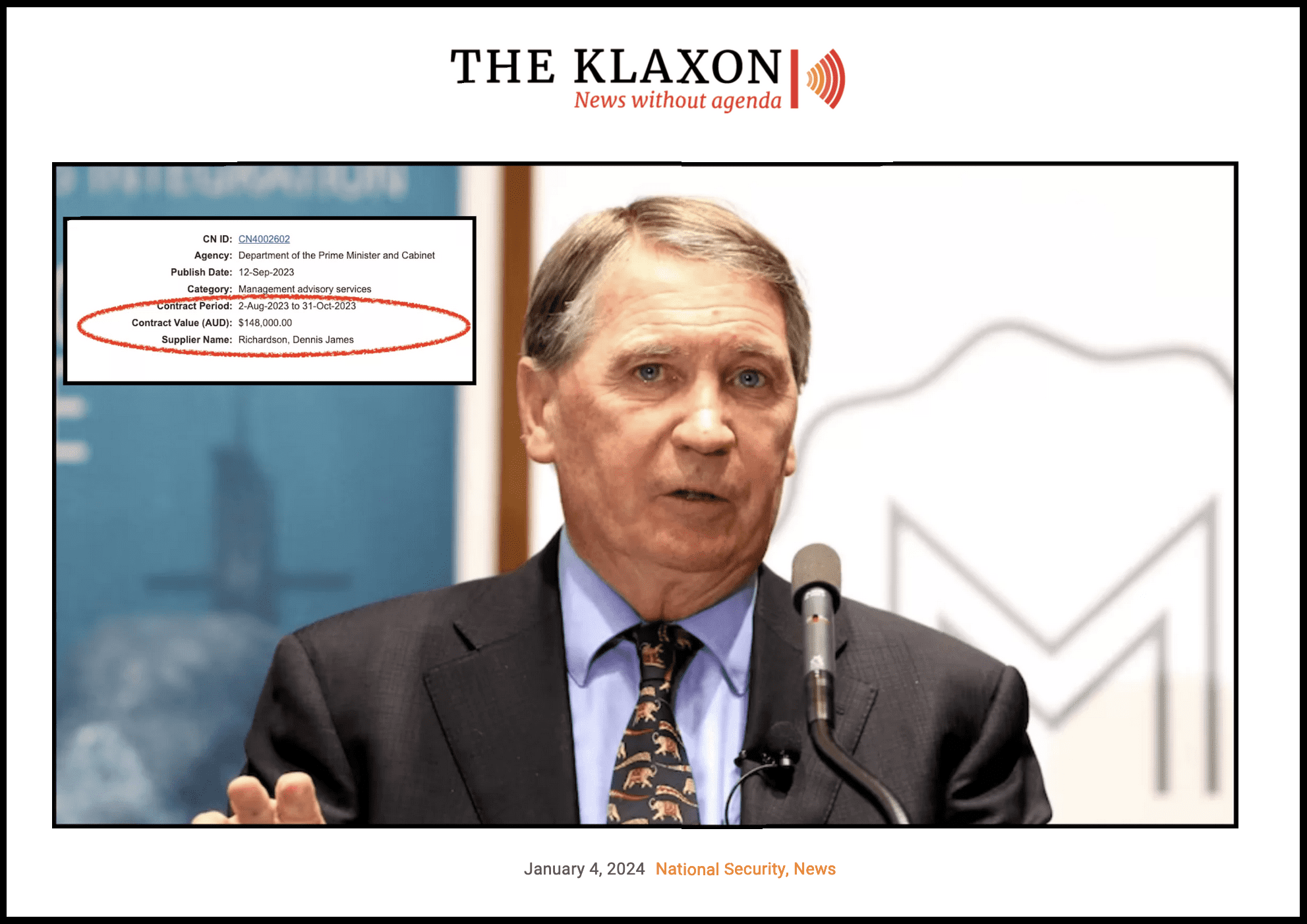
Just months ago Richardson was given a $50,000-a-month contract by PM&C. Source: The Klaxon
Significant Events
Under the Public Governance, Performance and Accountability (PGPA) Act 2013, Commonwealth entities must disclose in their annual reports details of “significant events” that occurred both during the financial year — to June 30 — as well as between June 30 and the date their annual report is completed.
The annual report “must detail any significant activities” that “affected the operations” of the entity, states the Department of Finance.
“By law, Commonwealth entity annual reports must disclose details of ‘significant events’ in the year”
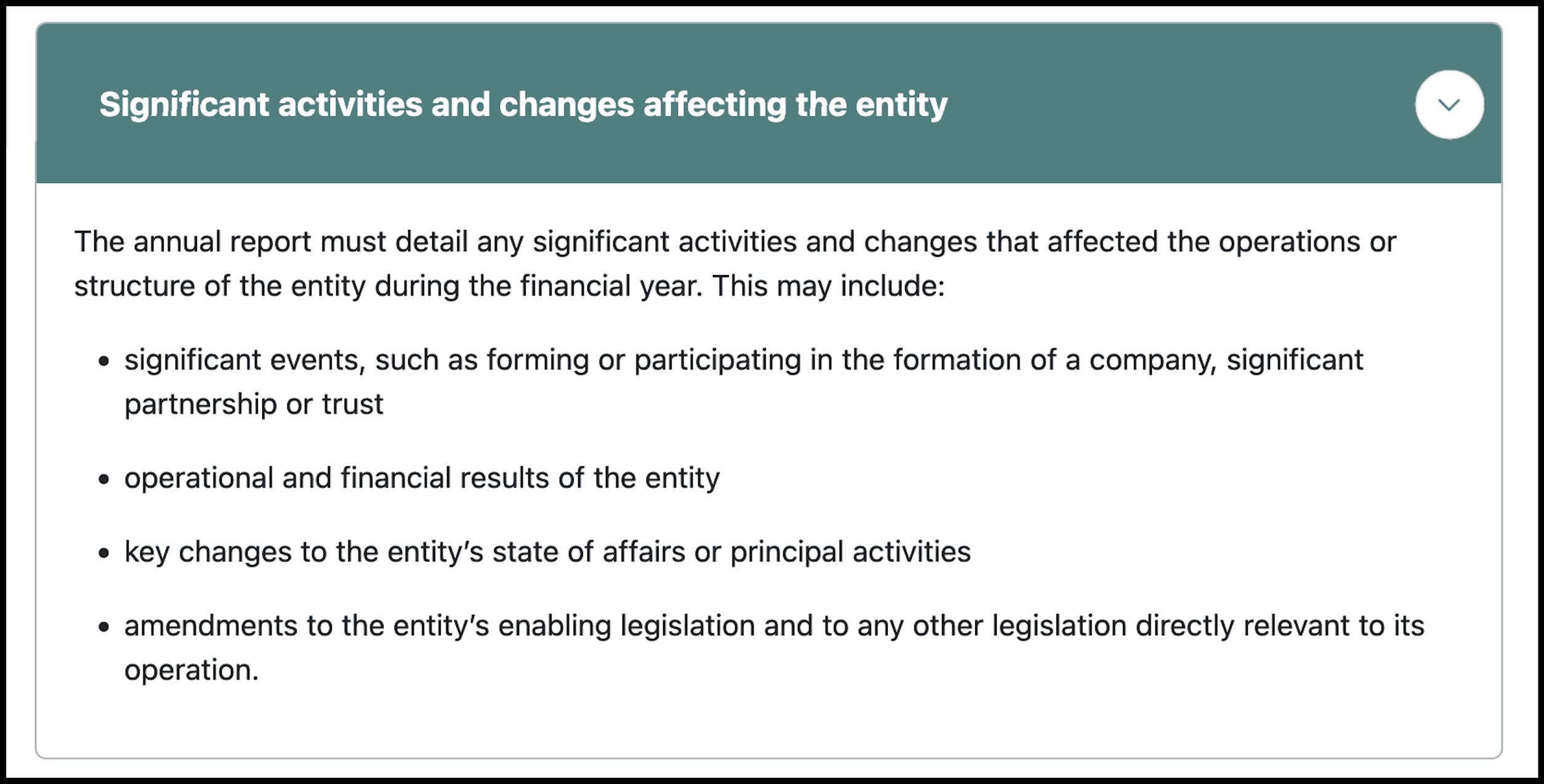
Commonwealth entities must include “significant events” in their annual report. Source: Department of Finance
Froude’s first day as National Archives Director-General was Monday, May 23, 2022, less than 48-hours after the Coalition conceded defeat at the federal election, ending almost a decade in power.
Although he started on March 23, Froude’s appointment had been announced on 17 March, by then Attorney-General Michaelia Cash.
“The annual report will be published once it is tabled,” National Archives told The Klaxon.
More to Come…
BEFORE YOU GO: Quality journalism is vital to our democracy. We need your help to keep doing this work. Please SUBSCRIBE HERE or support us by making a ONE-OFF DONATION. Thank you.
Anthony Klan
Editor, The Klaxon
Help us get the truth out from as little as $10/month.
Unleash the excitement of playing your favorite casino games from the comfort of your own home or on the go. With real money online casinos in South Africa, the possibilities are endless. Whether you’re into classic slots, progressive jackpots, or live dealer games, you’ll find it all at your fingertips. Join the millions of players enjoying the thrill of real money gambling and see if today is your lucky day!
The need for fearless, independent media has never been greater. Journalism is on its knees – and the media landscape is riddled with vested interests. Please consider subscribing for as little as $10 a month to help us keep holding the powerful to account.


